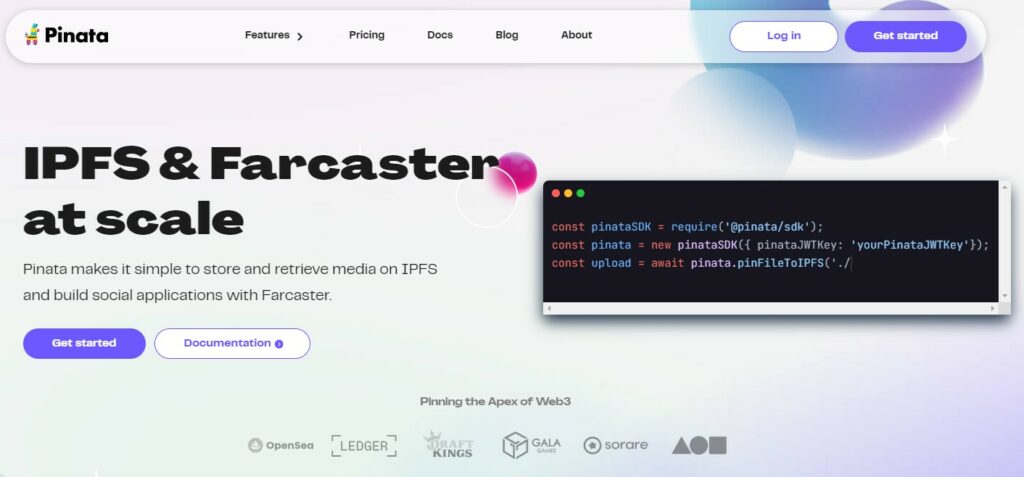Finding workflow setting systems such as Pinata alternatives can help you integrate your operations smoothly.
Selecting the right software to streamline your task management and collaborative efforts is crucial for staying on top of your team’s workflow.
If you’re exploring options beyond PINATA, you’re in good company.
Many businesses seek alternatives tailored to their specific needs, whether that’s to enhance ease of use, improve reliability, or to find a better price-fit.
It’s about finding the tool that best aligns with your operational goals and team’s preferences, ensuring everyone can contribute effectively without a steep learning curve.
A variety of PINATA competitors offer a broad spectrum of functionalities and unique selling points.
From platforms like Lark, which integrates chat, calendar, creation, and cloud storage, to task-specific alternatives such as Todoist and Google Tasks that focus on personal productivity and simple to-do lists.
On the other hand, solutions like Zenput, Axonify, and Jolt broaden the scope with more comprehensive task and team management features.
Each alternative presents distinct advantages that could be the key to optimizing your team’s performance and enhancing project outcomes.
What are Pinata Alternatives?

When searching for a different solution to Pinata, you’ll come across various software options designed to meet a similar set of needs, particularly in NFT storage and management.
Definition & Core Features
Pinata is known for facilitating the storage and management of NFTs (Non-Fungible Tokens) by providing an IPFS (InterPlanetary File System) infrastructure.
Alternatives to Pinata typically offer these core features:
- NFT Storage: The ability to securely store NFT data files.
- API Support: Tools for easy integration with other software, such as marketplaces or NFT creation platforms.
- Ease of Use: User-friendly interfaces that do not require extensive coding knowledge.
Use Cases & Benefits
You might consider alternatives to Pinata if you’re looking to tailor your NFT platform’s storage solutions to specific requirements.
Benefits of using these alternatives can include:
- Customization: Tailoring features to fit the unique workflow of your NFT projects.
- Scalability: Growing your infrastructure alongside your business needs.
- Cost-Effectiveness: Possibly offering better pricing structures for your particular use case.
Leveraging these alternative platforms can help you optimize your NFT-related operations, whether that means simplifying the minting process or enhancing the reliability of your storage system.
Decentralized Storage Solutions

In the realm of decentralized storage, you have varied options that cater to different needs, such as IPFS-based services and blockchain-integrated platforms, each offering unique features to support your data storage requirements.
IPFS-Based Services
InterPlanetary File System (IPFS) services offer you a peer-to-peer network for storing and sharing files in a distributed file system.
IPFS-based services are known for their efficiency in fetching files from nearby nodes, which can save bandwidth and improve speed.
- Chalk: Offers a user-friendly platform especially catered to NFT creators, allowing for a simplified minting process without the need for coding.
- Filebase: Priced at $20 per month, provides S3-compatible object storage, enabling you to store data securely and with redundancy across multiple decentralized networks.
Blockchain-Integrated Platforms
Blockchain-integrated platforms serve as another subset of decentralized storage, combining the immutability and security benefits of blockchain with storage capabilities.
- Pinata Alternatives: While Pinata itself is a common solution, alternatives might offer unique advantages, such as reduced transaction fees or different storage mechanisms tailored to various decentralized applications.
Remember, your choice should align with your specific needs, whether they pertain to transaction costs, storage methods, or platform ecosystems.
API-Driven Storage Services

When exploring Pinata alternatives for managing files on IPFS or similar decentralized storage solutions, you’ll find services offering robust APIs to streamline your experience.
These services typically provide vital features for seamless integration with your applications.
RESTful API Options
RESTful APIs are popular among storage services due to their simplicity and ease of use.
Typically, with these services, you can:
- Upload and manage files with straightforward HTTP requests like GET, POST, PUT, and DELETE.
- Access detailed documentation that assists you in integrating the API with your existing platforms or applications.
Examples of storage services offering RESTful API options include:
- Internxt Drive: Offers end-to-end encryption and a straightforward RESTful API for secure file management.
- Lark: Known for its collaboration tools alongside its file storage capabilities.
GraphQL API Services
For a more flexible and efficient querying experience, GraphQL API services allow you to:
- Retrieve exactly the data you need without overfetching, saving on resources and time.
- Make single API calls to get multiple pieces of data, which can be more efficient than RESTful API services.
Storage options with GraphQL API services might be less common but offer a powerful alternative for developers looking for more control over data transactions.
Content Management Systems

When selecting a CMS, you have the choice between traditional options and headless CMS platforms, depending on your specific project needs and integration requirements.
Headless CMS Integration
Headless CMS platforms are gaining traction due to their flexibility in content delivery and compatibility with various front-end frameworks.
For example:
- Airtable: Though primarily a project management tool, its capacity for content organization can serve as a useful adjunct for content strategies needing headless CMS capabilities.
- Contentful: A popular headless CMS that enables seamless content integration across multiple digital channels without the need for a traditional front-end delivery layer.
Traditional CMS Alternatives
If you prefer a more all-in-one solution for content management, handling everything from creation to presentation, consider alternatives like:
- WordPress.com: Often lauded for its ease of use and extensibility, it’s ideal if you’re looking for a cost-effective solution for managing digital content.
- Drupal: Known for its robustness and suitability for enterprise-level projects requiring complex content organization.
- Joomla: Provides a balance between user-friendliness and powerful features, another sound choice for content management.
Software Development Kits

When exploring alternatives to Pinata, you’ll find that a decisive factor is often the robustness of their Software Development Kits (SDKs), especially when it comes to implementing functionalities in different programming environments.
Javascript SDKs
If you’re working with web applications, JavaScript SDKs are indispensable.
They allow you to integrate with services seamlessly and handle NFTs or other blockchain elements within your web applications.
Look for SDKs that provide comprehensive documentation and community support, ensuring a smoother development process.
Mobile SDK Integration
For mobile app developers, finding a Pinata alternative with a reliable Mobile SDK for Android and iOS is crucial.
The SDK should offer straightforward methods for integrating blockchain functionalities into mobile apps, combined with efficient performance that doesn’t hinder the user experience on mobile devices.
Security and Privacy Considerations
When exploring alternatives to Pinata for software solutions, you should prioritize security and privacy.
These factors are crucial as they safeguard your digital assets and maintain the confidentiality of your data.
Let’s discuss what to look for in a potential alternative.
Encryption
Your chosen service should offer end-to-end encryption.
This ensures that:
- Your files are encrypted before leaving your device.
- Only you have access to the decryption keys.
Access Control
Control who accesses your content.
Features to look for include:
- Permission settings
- Authentication protocols
- The ability to revoke access
Compliance
Ensure the service is compliant with relevant regulations, such as GDPR, CCPA, and other data protection laws.
Open Source
Consider if the platform’s code is open source.
This allows for community review and enhances transparency.
Data Centers
Lastly, know where your data is stored.
This includes the geographic location of servers and the security certifications of the data centers.
Key Takeaways
When exploring alternatives to Piñata for your NFT and dApp development needs, you’ll find a landscape brimming with capable substitutes, each with its unique strengths.
Your quest to optimize development workflows can benefit from tools that offer:
- Robust APIs: Look for ease of integration that can accelerate your project development.
- Reliability: Stability is key; choose platforms known for consistent performance.
- Cost-Effectiveness: Assess the balance between features offered and pricing, including options for free plans.
- User Feedback: Consider community and reviewer insights to gauge the effectiveness of a tool.
Here’s a quick list of noteworthy Piñata alternatives to keep on your radar:
| Software | Top Features |
|---|---|
| Lark | Collaboration-centric features, real-time editing |
| Zenput | Streamlined operations management, mobile friendly |
| Axonify | Learning-oriented platform for workforce training |
| Jolt | Task management with a focus on checklist operations |
| Filecoin | Cryptocurrency integration, P2P network protocols |
Some tools, such as Otter, also provide value in content repurposing with features like live captioning and meeting summaries.
Whether it’s for task management, content storage, or developing cutting-edge NFT platforms, your choice should align with your project’s specific requirements and goals.

